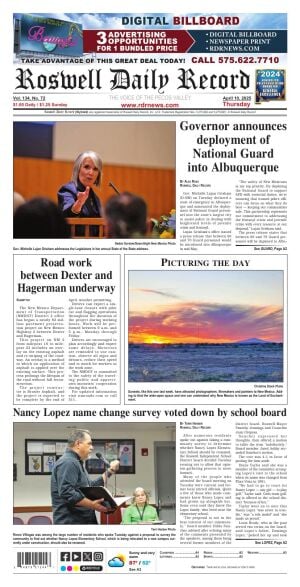The Kansas governor is warning that new tariffs will hurt agriculture, but one of the state’s senators is thanking farmers for believing they will lead to better trade deals.
“Kansas is a huge agricultural state, and I think where we’re going to see the greatest impact of these tariffs most immediately will be in our agricultural industry,” said Democratic Gov. Laura Kelly. “And I know that we’ve got at least a good portion of our congressional delegation working furiously to mitigate that damage and to turn the tide in a more positive direction.”
U.S. Sen. Roger Marshall, R-Kansas, is on the other side of the tariff issue.
“I really just want to shout out to all my farmers and ranchers for believing in President Trump and believing in us as we go through some of these early days of these trade wars with other countries,” Marshall said. “Thank you for your support.”
Trump escalates trade war
Kelly and Marshall both addressed tariffs on April 2, the day that President Donald Trump unveiled plans for global tariffs. The president referred to it as “liberation day,” and announced a 10% tariff on imports from all countries plus additional reciprocal tariffs on dozens of countries.
“For decades, our country has been looted, pillaged, raped and plundered by nations near and far, both friend and foe alike,” Trump said at the White House ceremony. “But now it’s our turn to prosper.”
Kelly, who is chair of the Democratic Governors Association, spoke beforehand during a press call hosted by the DGA. She was joined by Connecticut Gov. Ned Lamont.
Marshall spoke in a video posted to X, filmed just outside the White House, where he also called it “liberation day.”
“Tariff is a six letter word for tax, and this is a tax on the American people,” Lamont said. “I see that Donald Trump is calling today ‘liberation day.’ As far as I can see, the only thing being liberated will be $200, $300, $400 a month out of your wallet.”
Marshall says farmers want trade, not aid
Marshall, who serves on the agriculture committee, touted the $28 billion in subsidies to American agriculture under Trump’s first term to offset losses from a trade war.
He also noted a $10 billion package of aid to agriculture this year. Kansas producers are receiving $790 million, which is the fourth-highest of any state.
“We understand you want trade and not aid,” Marshall said. “For years, farmers have come to me saying we need someone to fight for us to give us fair, reciprocal trade agreements. And that’s exactly what we’re going to do. ... Hang in there with us. We’re going to be fighting to give you long term financial success.”
When previously addressing his plan for more tariffs starting April 2, Trump told farmers to “have fun!”
“We truly believe that tariffs are going to hurt us in the short term, but we certainly hope that it brings a better deal in the long term,” Kansas Farm Bureau president Joe Newland told reporters last month.
While Newland hopes the tariffs will lead to stronger trade deals, he said they are causing “uncertainty.”
“It’s uncertainty of what these trade tariffs and all would have long term effect, or if they’re a short-term effect, and whether we can improve our trade negotiations with these other countries because of them,” said Newland, a former state Republican lawmaker.
What Democrats say about Trump tariffs
Lamont called Trump’s approach to tariffs an “on again off again herky-jerky strategy.”
“There’s been a lot of back and forth from this administration on the issue of tariffs,” Kelly said. “This has caused unnecessary chaos, anxiety and uncertainty for businesses and consumers alike across the nation. There can be a time and a place for tariffs, but they need to be part of the negotiations toward a comprehensive, mutually agreed upon trade policy arrangement.”
She cited the USMCA trade deal from Trump’s first administration as an example, which she called “a very comprehensive, very thorough, thoughtful trade agreement.”
“The standalone tariffs being imposed today are harmful to all Americans, but especially to our farmers,” Kelly said. “Farmers need to be able to plan for the years ahead now. As the governor of Kansas, a state whose farmers feed the nation and the world, the imposition of tariffs without consideration of the immediate and devastating impact on our agricultural industry and others is unacceptable.”
Kelly said cost of living is the top issue nationwide, and tariffs will make it worse.
“These tariffs are expected to cost American families over $5,200 per year on nearly everything they buy,” Kelly said. “Much of our produce, our fruits and vegetables, come from Mexico. Building materials for new home construction or remodeling often comes from Canada. Even American cars that are assembled in the United States rely on materials imported from other countries. Americans did not vote for this chaos. It’s not what they want or need from their leaders.”
Kelly voiced support for “bringing businesses back home, by growing and strengthening our workforce and by investing in American-made manufacturing.” But she is skeptical that tariffs will bring jobs, such as in the auto industry, back to the U.S.
“There’s no promise that those workers, those jobs, will come back to the United States just based upon tariffs,” she said. “I don’t think that’s a given, you impose tariffs and businesses will flock back to the United States. I don’t think that’s what’s going to happen.”
Lamont said that Republican governors and business leaders share “a lot of the same concerns” privately.
Kelly said governors are working with their congressional delegations. She said she has had “some very healthy conversations with a portion of the Kansas delegation,” mentioning specifically Democratic U.S. Rep. Sharice Davids and Republican U.S. Sen. Jerry Moran.
She said that Moran “is working behind the scenes to ensure that we mitigate the damage that is done by the administration, and particularly in relationship to the tariffs.”
In her own statement April 2, Davids, who serves on the agriculture committee, said that Kansas will “have to foot the bill for President Trump’s reckless tariffs.”







